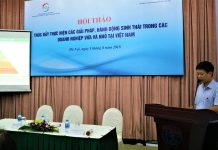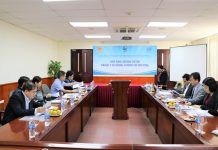On February 7, 2022, the workshop “Feasibility study of Energy-saving system using the heat exchanger G-HEX in Vietnam” took place in Hanoi. The workshop was held by the Representative Office of Asano Taiseikiso Engineering Co., Ltd (ATK) in Vietnam in collaboration with the Green Development Centre (Green.DC) in the form of off-line meeting and online meeting via zoom application.

Attending the workshop were representatives from the Ministry of Industry and Trade (MOIT), the Ministry of Natural Resources and Environment (MONRE), National Institute of Advanced Industrial Science and Technology (AIST), Vietnam Institute of Geosciences and Mineral Resources (VIGMR), Hanoi University of Science and Technology, Representatives of Unions, associations, research institutes and Enterprises, …
G-HEX heat exchanger has 3 main applications: using hot wastewater heat and cold wastewater heat from factories through G-HEX heat exchanger to provide initial heat for boiler and chiller system in the factory and geothermal heat application through heat exchanger and heat pump to supply heat to the air conditioning system. In Vietnam, G-HEX system using cold wastewater heat has been tested at C.P Food Factory (Hanoi) in 2021. Test results and calculations from experts show that G-HEX application has helped Enterprises in energy efficiency, reduce annual CO2 emissions and reduce environmental pollution. The tested G-HEX system in C.P Food is small scale but it delivers the very high performance.
Regarding geothermal application, the project only has only been carried out the drilling exploration, and measuring and assessing the potential in 2 locations in Ho Chi Minh City area with a depth of 50m. Initially result showing the potential for exploitation and application of this energy source. Studying geological conditions, Mr. Tran Trong Thang, researcher at VIGMR confirmed that the two large deltas in Vietnam, the Red Delta River and Mekong Delta River, have many aquifers and are very convenient to install the G-HEX system. Besides converting the thermal energy of the soil for heating and cooling, the device can be used for purposes such as providing hot water for living, …
Pilot projects on geothermal application was installed at VIGMR and at Chulalongkorn University in Thailand, applied for air conditioning system. It shows that the COP coefficient of the system is about 3.5 -> 3.7, saving about 35% of electrical energy compared to air conditioners. Dr. Youhei Uchida, an expert from AIST and also a member of the research team, assessed that the climate in Southeast Asia is very suitable for installing cold wastewater heat exchanger systems for air conditioning in buildings. He also recommended to study and install the system right before construction the foundation for high-rise buildings in Vietnam.

During the discussion sessions, the Speakers and Scientists discussed the advantages of the system in terms of energy efficiency as well as the challenges of installation in Vietnam. With the trend of improving the efficiency of hot and cold wastewater heat use in Vietnam as well as the problem to realize the commitment to reduce net emissions to zero by 2050, the workshop participants said that this project is very meaningful. However, in order to replicate, in the coming time, it is also necessary to study to reduce initial costs, improve technical capacity, and at the same time complete legal regulations on geothermal exploration and exploitation. Currently, regulations on “geothermal” in Vietnam’s legal documents are still incomplete, so the issue of licensing for testing and exploitation has not been guided. Therefore, Vietnam needs to soon develop guiding documents so that geothermal exploitation can be strongly developed, contributing to energy security of the country.







